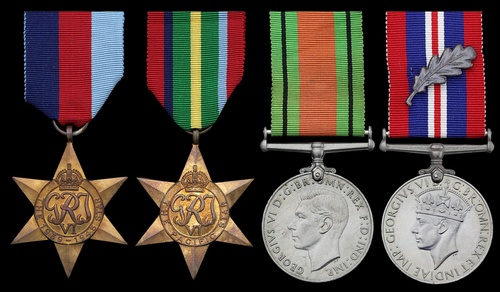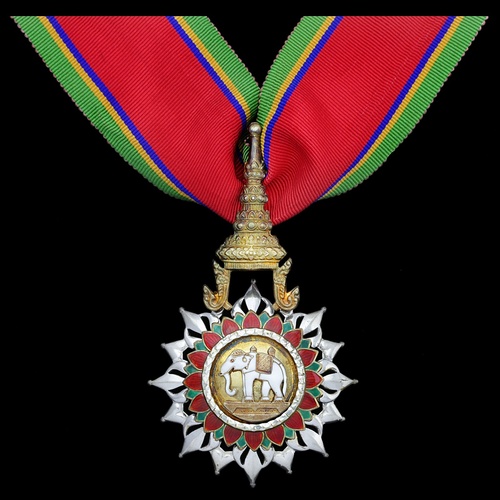Auction: 20001 - Orders, Decorations and Medals - conducted behind closed doors
Lot: 1005
'Stuart Simmonds was an influential teacher of classical Thai literature whose often unscripted lectures were always lively, thought-provoking and entertaining. His students will remember him as an impressive speaker and skilful raconteur who was able to bring exotic Thai literary characters to life in the classrooms of a British University.
He was one of the very few Western scholars who found the daunting task of understanding Thai classical poetry a challenge and who managed to master the obscurity of its 'high style' vocabulary and 'eccentric syntax'.
Between 1951 and 1967 he succeeded almost single-handedly in establishing the study of Thai languages, literature and culture in Britain at University level.'
Professor E. H. S. Simmonds: A Personal Note, refers.
An unusual group of five awarded to Captain E. H. S. Simmonds, Royal Artillery, who was captured by the Japanese at the Fall of Singapore in February 1942
Despite facing extensive hardships on the railways - including making an escape - he fell in love with the Thai language and later became a distinguished scholar who was decorated by the Thai King
1939-45 Star; Pacific Star; Defence and War Medals 1939-45 with M.I.D. oak leaf; Thailand, Kingdom, Order of the White Elephant, 2nd type, Commander's neck Badge, 90mm including crown suspension x 50mm, silver, silver-gilt and enamel, maker's mark to reverse of crown, with full neck riband, the first four in original O.H.M.S. box of transmission, named to 'E. H. S. Simmonds Esq., 17, Blenheim Way, Oxford.', with compliment slip, corresponding riband bar and envelope addressed to same from The War Office, dated 1947, nearly extremely fine (5)
Edward Harold Stuart Simmonds was born on 7 August 1919 at Littlehampton, West Sussex, the son of Harold and Margaret Simmonds of 17 Blenheim Drive, Oxford, England. His father ran a prosperous family business in farming supplies and machinery and wished to prepare his son to succeed him, however his mother hailed from a lineage with a strong military tradition. In consequence, Simmonds was somewhat conflicted but opted to attest for the Royal Horse Artillery in September 1937. Appointed to a commission in 1940, he was sent to south-east Asia and took part in the fighting at Johore and Singapore. Captured at the latter on 15 February 1942 and incarcerated at Changi until 5 May 1942, he was later transferred to Thailand and sent to a series of labour camps on the notorious Burma railway in western Thailand.
Growing affection
The four years spent in Thailand profoundly shaped Simmonds's life. From it came a deep understanding of the tenuous nature of human existence, a natural sympathy for the frailty and failings of others, and an extraordinary capacity to see hope and goodness in even the most distressing conditions. And, of course, it introduced him to Thailand, to the Thai people and their culture:
'Many years later, facing a student who had been far from diligent in learning the Thai numerals, he could recount that he had mastered them by observing the mile-stones as he had been marched from Bangkok to the camps in the early 1940s' (The Obituary of Professor E. H. S. Simmonds, refers).
The rebuke was gently delivered.
Where opportunities presented, Simmonds found opportunities to escape to the scattered Thai villages nearby where he met Thai villagers who were kind to him, giving him shelter, food and often medicine. He gradually familiarised himself with their language and observed their ways of life with growing affection (A Personal Note, refers). His M.I.9. debrief offers further details regarding these escapades; escaping with an American officer and fellow officer of the Royal Artillery, Simmonds spent twenty days 'on the run' in Thailand in January 1943. The trio were caught resting upon a jungle track and were later escorted back to Jamakan Camp by a Japanese guard.
The surrender of Japan on 15 August 1945 freed Simmonds to return to England and the family home in Oxford. Admitted to Keble College in 1946, he read English language and literature under tutor Stefanyja Ross, using her contacts to open doors at the School of Oriental and African Studies in London. A visit to the latter in July 1948 to discuss the prospects for the development of Thai studies with Professor Eve Edwards later resulted in him being offered a job as Lecturer in Linguistics - which he gratefully accepted. The Scarborough Commission had earlier recommended that as part of the general programme of growth in all fields of study relating to Asia and Africa, work on the languages of South East Asia should be concentrated at S.O.A.S., and Simmonds' appointment was part of this development.
Simmonds devoted the next thirty four years of his life to S.O.A.S., the demands being made upon him being varied and somewhat fascinating. Every year there was a beginner's language course to be delivered to diplomats and other government servants, students embarking upon research of Thai history and social sciences, and businessmen requiring a working knowledge of the language for their work. As his reputation grew, Thai graduates began to be sent by their universities to undertake research under his supervision. Called upon to deliver public lectures for the Overseas Service of the BBC, he ploughed his salary into travelling throughout Asia, being particularly concerned to extend his knowledge of Laos.
Appointed a Director at S.O.A.S., Simmonds finally retired in 1982. A much admired, indeed loved character, he died on 9 November 1994; sold with copied Japanese P.O.W. records and extensive research, including copied images of the recipient.
Subject to 20% VAT on Buyer’s Premium. For more information please view Terms and Conditions for Buyers.
Sold for
£350
Starting price
£180







